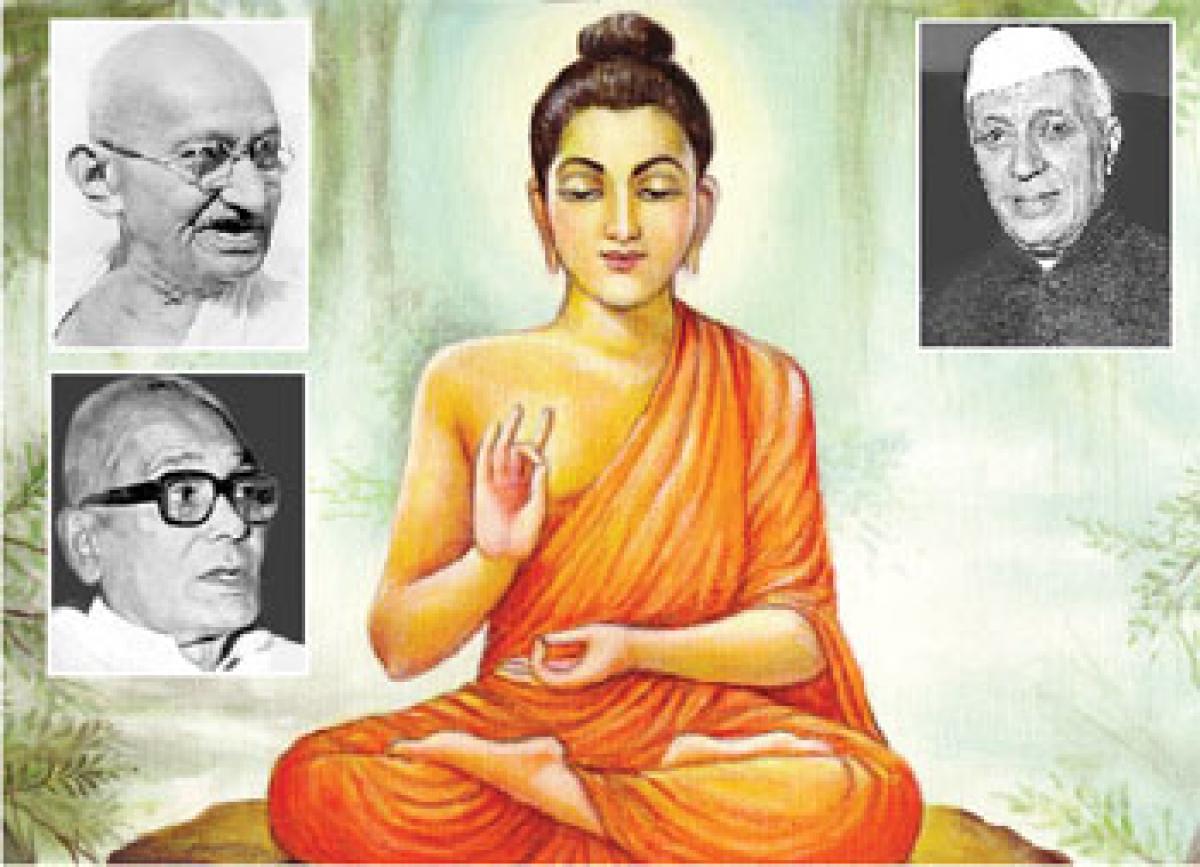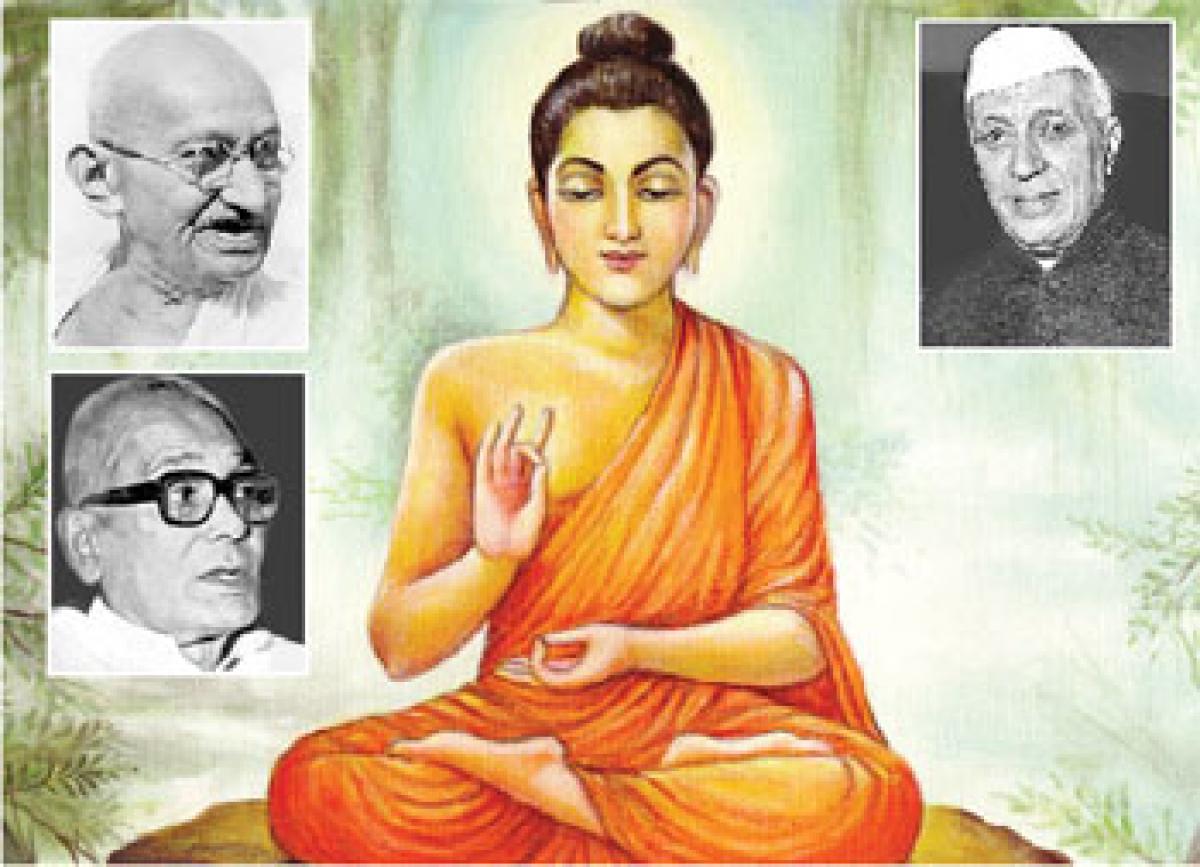Thinkers and philosophers from India

From ancient times India has held strongly a belief in the reality of the Avatar, the descent into form, the revelation of the God-head in humanity. India has grown up and persisted as a logical outcome of the Vedantic view of life and taken firm root in the consciousness of the race.
 Contribution of moral thinkers and philosophers from india and world-i
Contribution of moral thinkers and philosophers from india and world-i
Krishna
The historical character and the avatar From ancient times India has held strongly a belief in the reality of the Avatar, the descent into form, the revelation of the God-head in humanity. India has grown up and persisted as a logical outcome of the Vedantic view of life and taken firm root in the consciousness of the race.
All experience, according to Vedantic philosophy, is a manifestation of God because He is the only existence and nothing can be except as either a real figuring or else a figment of that one Reality. Therefore, every conscious being is in part or in some way a descent of the Infinite into the apparent finiteness of name and form.
But it is a veiled manifestation and there is a gradation between the Supreme Being of the Divine & there is a gradation between the consciousness shrouded partly or wholly by ignorance of self in the finite. When the Divine Consciousness or Power assumes the human form and chooses the human mode of .action out of its eternal Self-Knowledge,
when the Unknown knows Itself and acts in the frame of mental being and the appearance of birth, that is the height of the conditioned manifestation; it is the full and conscious descent of the God-head, it is the Avatar incarnate God. The fact about the existence of Sri Krishna both as the historical character and the Avatar was well established by the first century B. C. through various religious legends and Puranas.
Gautam Buddha
The Buddha was born in 563 B.C. as Siddhartha to Shuddhodana the king of Kapilavastu in Nepal. His mother Mayadevi expired when he was just 7 days old and he was brought up by his stepmother UauUiim. Siddhartha was made to lead a very sheltered life as the astrologers had predicted that he would give up worldly pleasures to follow a different path. The King wanted to avoid this at all costs and so did not let him out of the palace. He hoped that Siddhartha would one day become king.
When Siddhartha had grown into an intelligent young man, he ventured out of his palace one day, and chanced on a few sights that changed the course of his life. He first saw a very old man who could barely walk, a sick man who was in a great deal of pain, and lastly a corpse. He had never been exposed to pain before, and so these sights had a deep effect on him. His servant explained that pain and death were inevitable.
This made Siddhartha very sad and he started to rethink his life and began to try to fathom the reason of existence. Seeing him so thoughtful, his lather decided to get him married and get his mind off such serious topics. He was married to a beautiful princess culled Yashodhara. who Boon gave birth to a son who they called Kabul.
M.K. Gandhi
The great man is one who makes others great and who cames with L him the burden of the whole humanity. The greatest fact in the history of man on earth is not what he achieves materially or what he gains here, but the growth of his Soul from age to age in its search for truth. Those who take part in this adventure of the Soul secure an ever-lasting place 111 world history.
The greatness of Gandhi lies not in his heroic struggle for India’s freedom, bin in his ever striving for the Soul-force and in his insistence on the creative power of the Soul.
From the Gandhian application of socialism, however, it must none thought that Gandhi was a mystic or his socialism was only a matter of the mind. He was intensely practical and his principle was that the life of the individual should get all possible expression only in the context of society. He added to this the possibility of application of non-violence and truth in all activities and thought.
Gandhian idea in general and Gandhian socialism in particular is no mere theory, not merely an intellectual grasp or philosophical satisfaction which can be attained by simple speculation and thinking. The most particular and significant aspect of Gandhian socialism is the emphasis which Gandhi laid on the internal aspect of life.
Jawaharlal Nehru
Nature and circumstance were both kind to Jawaharlal Nehru. He was born into the Kashmiri Brahmin community, the must aristocratic sub-caste in the Hindu social system. His father was a distinguished and wealthy barrister, modem, urbane, highly cultivated and lavishly generous.
As an only son-and the only child for eleven years-Jawaharlal was the focus of concentrated affection. He had. too. the leisure and learning of an English aristocrat in the secure atmosphere of the Edwardian Age-private tutors, Harrow Cambridge and the Inner Temple. When he was drawn to the political arena soon after his return to India, his path was eased by the guidance and support of his father and Gandhi.
This tendency to depend on a strong, decisive and older man a marked feature of Nehru’s character in his adult life. Even before the death of his father in 1931 he had already transferred this dependence in large measure to Gandhi, who served as guide, counsellor and father-confessor in matters both political and personal. After Gandhi’s death the habit continued but in a less pronounced manner. Indeed, it was not until his early sixties that Nehru emerged mostly from the shadow of the two men who exercised more influence on his character than all other persons.
A man of wide vision and broad outlook, Nehru did not subscribe to the doctrine that the end justifies the means. He writes that a worthy end should have worthy means leading up to it. That seems not only a good ethical doctrine, but sound practical politics, for the means that are not good often defeat the end in view and raise new problems and difficulties. And then it appears so unbecoming, so degrading to the self-respect of an individual or a nation to submit to such means, to go through the mire. Again and again Nehru told his audiences, both in India and abroad, that this principle of right means Jeadin.fi up to right results should be adopted in international relations also.
Jayaprakash Narayan
Jayaprakash Narayan, born in a middle-class family of Bihar, received his education both in India and U. S. A. While still a young boy, he became an ardent nationalist and leaned towards the revolutionary cult of which Bengal was the noble leader at that time, but before his revolutionary leanings could mature. Gandhi’s first non-cooperation movement swept over the land as a strangely uplifting hurricane. He had an unusual experience of soaring up with the winds of a great idea.
While under the spell of Marxism, J. P. Narayan was much impressed by the Marxian philosophy of revolution. It seemed to him a surer and quicker road to the freedom of a country and the emancipation of its masses than Gandhi’s technique of civil disobedience and non-cooperation. The thrilling triumph of the great Lenin in Russia, accounts of which he consumed with unsatiated hunger, seemed to establish beyond doubt the supremacy of the Marxian way to revolution.
Also, Marxism stood, he felt, for equality and brotherhood-the qualities without which freedom is not enough. He interpreted the word ‘freedom’ and showed his leaning: towards Marxism in the following lines: “. It must mean freedom for all-even the lowliest-and this freedom must include freedom from exploitation, from hunger, from poverty.
I cannot say what were the early experiences that had laid the foundations in the subconscious mind of sympathy with poverty and suffering. But the latent sympathy certainly was there, and it was awakened and brought to ill the surface of conscious living by Marxism.” At this time he was not very certain about Gandhi’s stand on the vital question of equality which captivated him as much as the ideal of freedom.
Commitment to Sarvodaya
Jayaprakash completely broke away with Marxism and turned to Sarvodaya philosophy. He attempted to reinterpret the basic-question of individual behaviour that he was to exhibit in the realm of politics from an ethical viewpoint. The study of matter is an objective exploration, whereas that of consciousness is subjective realization.
The study of matter, the objective exploration, science in short, is necessarily amoral. The Marxists (and the materialists generally), having reduced consciousness to a behaviour of matter, naturally knocked the bottom out of ethics.
They talk a good deal no doubt of revolutionary ethics, but ihm is nothing more than the crassest application of the theory that the end justifies the means Once an individual persuades himself, sincerely or otherwise, that he is on the side of the revolution (or the Party of the People), he is free to commit any infamy whatsoever.
Source: iasexamportal.com








